
Commentary
-
Our commentary partners will help you reach your own conclusions on complex topics.
In 1978, the Supreme Court ruled that colleges may use race as a factor in student admissions so long as they avoid numerical racial quotas. In 2003, and again in 2016, the Court upheld the constitutionality of preferences to achieve a racially diverse student body. Yet the Court has never seemed entirely comfortable with race-based admissions, for understandable reasons.
Counting by race violates the principle of a colorblind Constitution. It is contrary to the 14th Amendment and to the Civil Rights Act. It’s unfair and unjust and often hurts the very people that it’s trying to help. The Court’s discomfort with racial preferences is no secret. There have been moments when the Court has thrown up its hands and wished the entire problem would just disappear.
In 2003, Associate Justice Sandra Day O’Connor wrote that the Court expected racial preferences to be unnecessary in twenty-five years. Well, time’s up. In October, the Supreme Court heard arguments in two cases where it will decide whether schools such as Harvard discriminate against applicants when determining the makeup of incoming classes.
Unlike before, however, the plaintiffs are non-White. They’re Asian Americans. Also unlike before, the Court is not expected to be mealy-mouthed when it issues its judgment. Hardly anybody in Washington believes that race-based college admissions will withstand the Court’s 6 to 3 conservative majority. Another decades-old precedent may soon be overturned.
The left has treated the affirmative action cases as racial analogues to last term’s Dobbs v. Jackson Women’s Health Organization in which the Court reversed the Roe v. Wade decision and restored abortion law to the states.
After Dobbs, the media portrayed the Court as anti-democratic, counter-majoritarian and contemptuous of public opinion. And they had half a point. The polls really did show that the public was against overturning Roe v. Wade, even if that same public may have misunderstood the holdings in Roe and Planned Parenthood v. Casey, which legalized abortion throughout a pregnancy’s duration.
If the analogy between abortion and racial preferences is an exact, for most of the public, affirmative action is a settled issue. And that settlement, judging from polling data and electoral returns, has been remarkably durable and overwhelmingly lopsided. Americans support general efforts to promote opportunity and inclusion, but they oppose the explicit use of race as a criterion in college admissions, hiring and promotion. The Court won’t be risking a backlash if it ends affirmative action. It will be on the side of the people.
The public has been against preferences since they were first imposed. And today’s anti-preferences coalition includes not just Whites, but also members of racial and ethnic minorities. A Pew Research Center poll from the spring of 2020 found that 73% of Americans did not believe that race or ethnicity should factor into college admissions.
Majorities of self-identified White, Black, Hispanic, and Asian respondents all said race or ethnicity should not be a factor. Pew ran the same poll this year. The numbers have not changed. If Americans truly believed that only race-based policies can bring about a diverse society, then one would expect them to support color consciousness when it is put to a vote.
They don’t. They reject it and not just in red states. In 1996, California voters approved Proposition 209 to ban discrimination by race in public employment, education and contracting. Almost a quarter of a century later in 2020, Californians were asked to vote on Proposition 16, which would have repealed Prop 209.
It lost by a 14-point margin. For too long, the Court has said that discrimination by race is necessary to solve the problem of discrimination by race. The result has been a legal morass, a constitutional tragedy and racial alienation. If the Court fixes its mistake this term, its legitimacy won’t be questioned. Its integrity won’t be endangered. The will of the people won’t be subverted. It will be affirmed.
-
Trump’s baby-faced bulldozers just getting started
President Donald Trump leads the youngest group of top Cabinet officials and advisers of any president in more than three decades. Age was a central issue in the 2024 campaign, with voters expressing deep concerns about former President Joe Biden’s ability to begin a new term at 82. However, Trump is now the oldest person… -
New Orleans attack shows US must put ISIS on defense
At least 15 people have now died following what investigators say was a lone-wolf terrorist attack carried out by a U.S. Army veteran in New Orleans over New Year’s. The suspect publicly declared his allegiance to ISIS prior to the attack, and he flew an ISIS flag from the rented vehicle he used to run… -
The Trump honeymoon will not last
When President-elect Donald Trump won the presidency in 2016, his victory was marked by celebration but also immediate backlash, including widespread protests and the rise of the “resistance” movement. Trump’s job approval rating never exceeded 47%, making him the first president in history to never reach 50% approval in the Gallup poll during his term.… -
Why the presidential election result wasn’t even close
President-elect Donald Trump is the first person in over 120 years to be elected to two non-consecutive presidential terms. He swept every swing state and made significant gains among Hispanic voters, narrowing Democratic margins in traditionally blue states like Virginia and New Jersey. He won the Electoral College decisively, although the national popular vote margin… -
Joe Biden’s failed foreign policy legacy
On Wednesday, Oct. 16, Democratic presidential nominee Kamala Harris faced tough questioning on Fox News, where host Bret Baier pressed her on immigration, the economy and the Biden administration. When asked what she would do differently from President Biden, Harris responded, “Let me be very clear, my presidency will not be a continuation of Joe…
Latest Opinions
-
 AP Images
AP Images
Trump’s Department of Justice removes database tracking police misconduct
-
 Getty Images
Getty Images
DOE to investigate Maine Education Department over trans athletes, Title IX
-
 Reuters
Reuters
New coronavirus discovered in bats similar to COVID-19
-
 AP Images
AP Images
Pope Francis in critical condition with asthma-like respiratory crisis
-
 Getty Images
Getty Images
Knife attack in eastern French city claims one life, injures at least 2 others
Popular Opinions
-
In addition to the facts, we believe it’s vital to hear perspectives from all sides of the political spectrum.






